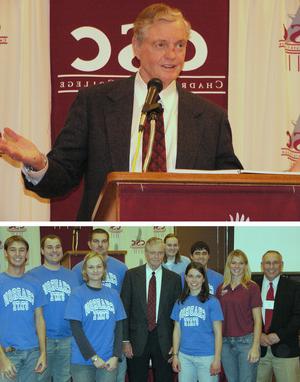CSC workshop told help is available to Nebraskans with business ideas

How to improve the economy and keep Nebraska’s youth in the state were the focus of the Ag Entrepreneur Workshop organized by U.S. Rep. Tom Osborne and his staff and hosted by Chadron State College on Wednesday.
The participants learned there’s considerable help available from state and federal agencies for enterprising individuals with ideas about how to make a living in rural Nebraska. Examples were given of people who have already succeeded in making a business click and steps that are being taken by communities to keep them thriving or make them thrive again.
Osborne, who closed the session with a 45-minute talk, said Nebraska
has many possibilities for growing that he calls “agritourism.” He said anything from cutting a maze in a cornfield that visitors pay to explore to converting an old barn into an entertainment center has worked at places in the state. The only limits are a person’s imagination, he said.
He also noted that some wealthy out-of state hunters will pay several thousand dollars to bag a trophy buck and up to $150 a day to hunt pheasants on farm and ranch land.
Osborne said those interested in such ventures need to size up their assets, decide what might work for them and use some of the numerous state and federal agencies that are available to develop a business plan, learn how to access the needed capital and perhaps write an application for a grant that could be used to start the enterprise.
He said the same is true for enterprising individuals who have products or services to sell.
The congressman said Internet availability, allow people living in rural Nebraska to “market the world.”
Osborne gave several examples of how Nebraskans are using the Internet to succeed. He said a wife of one of his former University of Nebraska football players lives in Wahoo but writes briefs for two law firms in Dallas and a Neligh resident makes a living drawing Flintstone cartoons.
“He can live in Neligh at about a fourth of the cost of living in Hollywood, but his salary is still on the Hollywood scale,” Osborne stated.
He also said Cody Foster of Valentine began using his artistic ability and encouragement from his grandmother to design various whimsical items when he was 16. Some 15 years later, Foster has several employees helping make a variety objects ranging from lapel pins and dolls to mantel pieces that are valued by decorators and collectors. Osborne said Foster’s firm prints a catalog and uses the Internet to market his unusual products all over the world.
Osborne added that friendliness and personal attention are commodities customers appreciate.
Nebraska definitely needs to develop all the new enterprises possible, Osborne pointed out. He said 80 percent of the state’s 93 counties are designated as “out-migration” counties because they have lost at least 15 percent of their population in the last 20 years. Many of them have only 25 to 50 percent of the population they had in the 1930s, he related.
All told, he said rural Nebraska has lost 300,000 people in the last 75 years.
He said the chances of a major company deciding to place a new plant in rural Nebraska are minimal. He said a better way to boost Nebraska’s economy is to show high school students how to write a business plan, prepare a grant application and let them come up with ideas for business ventures.
“If we give them hands-on experience about how to start a business while they’re in high school, it often encourages them to start a small business later on,” said Osborne. He added that in some high schools up to 75 percent of the students say they would like to own their own business. But, he noted, by the time they graduate from college, that number has often dwindled rather dramatically.
Osborne said he believes the state could do more in helping start and expand businesses by giving tax breaks for purchasing liability insurance and establishing venture capital funds.
Osborne noted that ideas people pick up at workshops such as the one at Chadron State can revitalize a community and give people both young and old a chance to remain in Nebraska. Up to 200 people, many of them Chadron State students, attended portions of the workshop.
Dr. Rick Koza, a CSC business professor and sponsor of the college’s chapter of Students In Free Enterprise that helped sponsor the workshop, attended several of the “table topics” session in which representatives of various agencies told about their programs.
“It was interesting to learn how many programs are already in place and how much help is available to people who have ideas for starting or expanding a business,” said Koza. “There was a lot of interaction in most of the groups and I’m sure some people left with some ideas about what may work for them.”
Category: Campus News
